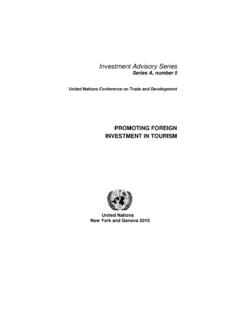Transcription of The contribution of services to development and the role ...
1 OECD Global Forum on International Investment OECD Investment Division THE contribution OF services TO development AND THE ROLE OF TRADE LIBERALISATION AND REGULATION ODI Briefing Notes, DFID, UK Session : Trade policy These briefing notes are distributed as part of the official conference documentation and serve as background material for the relevant session in the programme. The views expressed in this paper do not necessarily represent those of the OECD or its member governments. 2 Table of Contents Briefing Note 1 - Overview Page 3 Briefing Note 2 - Tourism Page 6 Briefing Note 3 - The Financial Sector Page 8 Briefing Note 4 - The Electricity Sector Page 10 Briefing Note 5 - The ICT Sector Page 12 Briefing Note 6 - Health services Page 14 Briefing Note 7 - Temporary Movement of Persons Page 16 3 Briefing Note 1 January 2008 Overview1 The service sector makes an important contribution to GDP in most countries, providing jobs, inputs and public services for the economy.
2 Trade in services can improve economic performance and provide a range of traditional and new export opportunities. However, services liberalisation also carries risks, and appropriate regulation and other complementary policies help to ensure that liberalisation delivers the expected benefits. We have reviewed the literature on these issues for 6 service sectors (tourism, financial services , energy services , information and communications technology, and Mode IV), and produced a summary Briefing Note on each. The contribution of services to development The service sector is an important component of any country s economy. It makes a direct and significant contribution to GDP and job creation, and provides crucial inputs for the rest of the economy, thus having a significant effect on the overall investment climate, which is an essential determinant of growth and development .
3 Some service sectors such as the health, education, water and sanitation sectors, are also directly relevant to achieving social development objectives. The service sector accounts for a significant proportion of GDP in most countries, including low income countries, where it frequently generates over 50% of GDP. The process of development usually coincides with a growing role of services in the economy (alongside a reduced role for agriculture). Thus services constitute an increasing percentage of GDP in nearly all developing countries. services contributed 47% of growth in Sub-Saharan Africa over the period 2000-2005, while industry contributed 37% and agriculture only 16%. Recent growth in Africa is due to services as much as natural resources or textiles (even in countries benefiting from trade preferences in these products).
4 The question is nor whether to move into services , but how and at what speed to move into services . Many services are key inputs to all or most other business infrastructure services such as energy, telecommunications and transportation; financial services which facilitate transactions and provide access to finance for investment; health and education services which contribute to a healthy, well-trained workforce; and legal and accountancy services which are part of the institutional framework required to underpin a healthy market economy. These service sectors are thus a key part of the investment climate, and can have a much wider impact on overall business performance and the level of investment, and hence growth and productivity in the economy. The potential benefits of services trade liberalisation Trade in services can help create opportunities for countries to expand their outputs of services in sectors where they have a comparative advantage, thus creating jobs, contributing more to GDP and generating foreign exchange.
5 This can be especially important for those countries which are relatively isolated from world goods markets, due to poor transport infrastructure, or being landlocked, such as many sub-Saharan African countries. services exports can be an important part of a developing country s growth strategy. For example, India has been capitalising on a boom in exports of IT enabled services as firms have increasingly outsourced certain administrative functions to lower cost countries. And (labour-intensive) tourism is now a significant part in the economy of many low-income countries. In addition, imports of services can significantly improve performance by bringing greater competition, international best practice, better skills and technologies, and investment capital. The entry of foreign service 1 This Briefing Note is based on work funded by DFID and written by Massimiliano Cali, Karen Ellis and Dirk Willem te Velde.
6 The authors alone are responsible for the views expressed. This is a draft; comments are welcome to the authors of the main report (available soon) 4 providers may therefore yield better services for domestic consumers, and improve the performance and competitiveness of domestic firms. Given that much trade in services is brought about through foreign direct investment, it can also serve to bring much needed capital into the country. Thus it can help to stimulate investment in infrastructure development for example, where government or domestic private sector funding may have otherwise been difficult to secure (given public sector budget constraints, and the fact that many developing countries have limited access to international capital markets). The need for complementary policies and the role of regulation However, experience has shown that services trade liberalisation also carries risks and potential costs that foreign providers might cherry-pick the most profitable customers and refuse to serve others; may leave the country at the first sign of financial difficulty exacerbating instability; may replace domestic providers, or may contribute to brain drain.
7 Government intervention to regulate the market and to ensure there is sufficient competition is therefore crucial if the benefits of services liberalisation are to be realised. Indeed, regulation is crucial in many service sectors regardless of whether the sector is open to trade. Due to the nature of services (which are commonly characterised by elements of natural monopoly, high barriers to entry, and informational asymmetries), regulation is usually required to ensure that service markets work properly. For example, regulation is required to: create a level playing field and facilitate competition between market players ( by ensuring access to the grid or network for new entrants in the electricity or telecommunications sector), guarantee the quality of the services provided ( by specifying qualification requirements for service providers such as doctors, engineers and architects), protect consumers ( from fraud, or misselling) ensure sufficient provision of information ( about the availability and features of services provided), prevent environmental degradation ( arising from high levels of tourism development ), ensure adequate access to services (such as electricity, health and education), maintain financial stability (in the banking sector), minimise disruptions in supply (in electricity).
8 However, regulation can be unnecessarily burdensome and distortionary, and can sometimes represent a major barrier to services trade. Barriers can sometimes be an unintended consequence of a regulation ( where the professional qualifications required are available only from national educational establishments), or can sometimes be imposed deliberately to prevent or manage foreign entry through limits on foreign equity participation, or requirements for foreign entrants to form joint ventures with domestic companies. Thus liberalising trade in services usually involves some degree of deregulation or regulatory reform to make it easier for foreign firms to enter the market. But it is also the case that new or more sophisticated regulatory frameworks are often required in order to ensure that liberalisation delivers the expected benefits. And the establishment of an appropriate regulatory framework can also be important in enabling a country to take advantage of potential export opportunities, by developing well-functioning domestic service sectors that meet world standards of provision.
9 For example, by facilitating the development of a safe and reliable health care system, a good regulatory framework can enable a country to take advantage of new opportunities to sell health tourism services . Similarly an appropriate legal and regulatory framework in the financial sector can help to build consumer confidence in a new offshore financial centre. Other complementary policies can also help to maximise the benefits and minimise the risks of service sector liberalisation. These vary from sector to sector, and may include: the provision of education and training ( in IT, medicine, or languages), that will enable domestic firms as well as individuals to take advantage of service sector export opportunities; mechanisms to enhance spillovers and technological diffusion from foreign export providers; or a strategy to manage the temporary migration of individuals abroad to provide a service, to facilitate greater remittances and maximise the chance of return with enhanced skills etc.
10 5 Conclusion Evidence shows the potential gains from service sector liberalisation are substantial. But there are also risks which need to be considered against the risks of not liberalising. A range of complementary policies, including appropriate regulation, the creation of competitive market conditions, the provision of specialised training of adequate quality and scale, and policies to protect health, environment and consumers and ensure adequate access to services , are crucial if liberalisation is to deliver the expected benefits. 6 Briefing Note 2, January 2008 Tourism2 Tourism is the biggest export service sector in many low-income developing countries. Its value is already significant ( of GDP in Africa, 15% of employment in the Caribbean) and is set to increase further in all world regions, especially in developing countries, reflecting increased demand, comparative advantages and liberalisation.

















